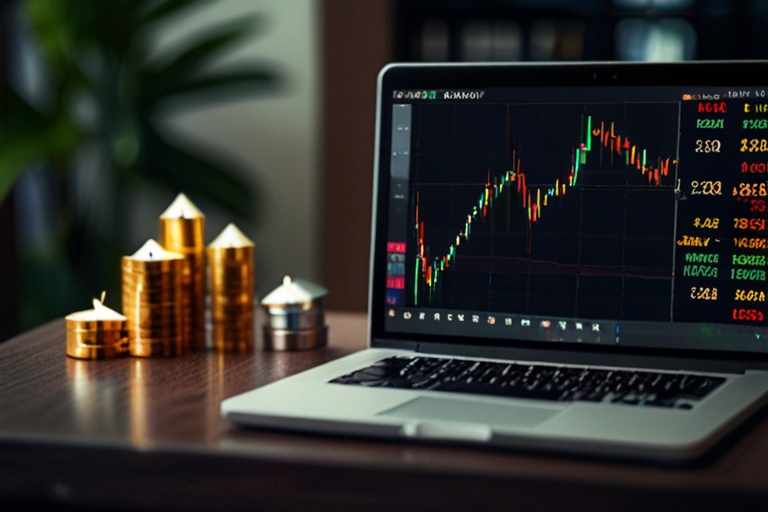
6 minute read
How To Start Forex Trading in Nigeria for beginners
This beginner-friendly guide will help you understand the steps required to get started with forex trading in Nigeria, from learning the basics to choosing a broker and developing a trading strategy tailored for success.
Best Forex broker in Nigeria
1️⃣ Exness: Open Account | Go to Website
2️⃣ JustMarkets: Open Account | Go to Website
3️⃣ XM: Open Account | Go to Website
4️⃣Pepperstone: Go to Website
5️⃣Avatrade: Open Account | Go to Website
6️⃣FpMarkets: Open Account | Go to Website
7️⃣XTB: Go to Website
8️⃣FBS: Go to Website
9️⃣Amarkets: Go to Website
Step 1: Understand the Basics of Forex Trading
Before you begin, it’s essential to understand what forex trading is and how it works.
What Is Forex Trading?
Forex trading is the act of exchanging one currency for another in the foreign exchange market. For example, trading the EUR/USD means exchanging euros for U.S. dollars.
The forex market is open 24 hours a day, 5 days a week, and is the largest financial market in the world.
Key Forex Terms:
Currency Pair: Two currencies being traded (e.g., USD/NGN, EUR/USD).
Pip: The smallest movement in price (often 0.0001 for most pairs).
Leverage: A tool that allows you to trade larger positions with a small amount of capital.
Spread: The difference between the bid price and ask price.
Stop-Loss: A risk management tool that closes your trade automatically if it reaches a certain loss.
Why Forex Trading in Nigeria?
Accessibility: You can start trading with as little as $10–$100.
High Liquidity: The forex market allows for easy entry and exit of trades.
Flexible Hours: Trade anytime due to the 24-hour market.
Step 2: Learn Forex Trading Strategies
To succeed in forex trading, you need a strategy that works for you. Here are the two main types of analysis used in trading:
Fundamental Analysis:
Focuses on economic factors such as interest rates, inflation, employment data, and geopolitical events.
For Nigerian traders, it’s important to keep an eye on:
Central Bank of Nigeria (CBN) policies.
Oil prices (since Nigeria’s economy is oil-dependent).
Global economic news affecting major currencies like USD, EUR, and GBP.
Technical Analysis:
Relies on charts and indicators to predict price movements.
Common tools include:
Moving Averages (MA)
Relative Strength Index (RSI)
Fibonacci Retracements
Support and Resistance Levels
Popular Trading Strategies:
Day Trading: Opening and closing trades within the same day.
Swing Trading: Holding trades for several days to capture larger price movements.
Scalping: Making multiple quick trades to profit from small price changes.

Step 3: Choose a Reliable Forex Broker in Nigeria
A forex broker is your gateway to the forex market, so choosing the right one is crucial.
5 BEST FOREX BROKERS in The World
Exness: Open An Account or Go to Website
JustMarkets: Open An Account or Go to Website
XM: Open An Account or Go to Website
FP Markets: Open An Account or Go to Website
Avatrade: Open An Account or Go to Website
What to Look for in a Broker:
Regulation: Choose a broker regulated by reputable authorities like the Financial Conduct Authority (FCA), Cyprus Securities and Exchange Commission (CySEC), or South Africa's FSCA.
Account Types: Look for brokers that offer beginner-friendly accounts like micro or demo accounts.
Trading Platform: Ensure the broker provides a reliable platform like MetaTrader 4 (MT4), MetaTrader 5 (MT5), or a user-friendly mobile app.
Low Fees: Compare spreads, commissions, and withdrawal fees.
Recommended Brokers for Nigerian Traders:
HotForex: Popular for its low minimum deposit and regulation by global authorities.
Exness: Known for instant withdrawals and flexible leverage.
OctaFX: Offers a beginner-friendly platform and educational resources.
FXTM (ForexTime): Regulated in multiple jurisdictions and widely used in Nigeria.
Check Payment Methods:
Ensure the broker supports Nigerian-friendly payment options like:
Bank transfers.
Naira wallets.
Online payment platforms like Skrill and Neteller.
Step 4: Open a Forex Trading Account
Register with a Broker:
Visit the broker’s website and sign up for an account. You’ll be required to provide personal details like your name, email, and phone number.
Verify Your Identity:
Submit documents such as:
A government-issued ID (e.g., passport, driver’s license).
Proof of address (utility bill or bank statement).
Fund Your Account:
Deposit funds into your trading account using your preferred payment method. Most brokers accept deposits in USD or NGN.
Start with a Demo Account:
Use a demo account to practice trading with virtual funds before risking real money.
Step 5: Practice with a Demo Account
Why Use a Demo Account?
It’s risk-free and helps you get familiar with the broker’s platform.
Allows you to test your trading strategy without using real money.
What to Do in a Demo Account:
Practice placing trades.
Experiment with leverage and position sizes.
Use indicators and tools to analyze the market.
Step 6: Develop a Trading Plan
A trading plan is your blueprint for success. It helps you stay disciplined and avoid impulsive decisions.
Define Your Goals:
Are you looking for short-term profits or long-term gains?
Set a Risk Limit:
Never risk more than 1-2% of your trading capital on a single trade.
Choose a Strategy:
Stick to one strategy and refine it as you gain experience.
Track Your Trades:
Maintain a trading journal to review your performance and learn from your mistakes.
Step 7: Start Trading on a Live Account
Once you feel confident, transition from a demo account to a live account.
Start Small:
Begin with a small amount of capital to minimize risk.
Focus on Major Currency Pairs:
Pairs like EUR/USD, GBP/USD, and USD/JPY are highly liquid and less volatile.
Set Stop-Loss and Take-Profit:
Use these tools to manage risk and lock in profits.
Monitor the Market:
Stay updated on global economic news and events that may impact currency prices.

Step 8: Manage Risk
Risk management is key to surviving and thriving in forex trading.
Use Leverage Wisely:
While leverage can amplify profits, it also increases risk. Use it cautiously.
Diversify Your Trades:
Avoid putting all your capital into a single trade or currency pair.
Control Your Emotions:
Don’t let greed or fear drive your decisions. Stick to your trading plan.
Step 9: Stay Educated
Forex trading is a continuous learning process. Improve your skills by:
Reading Books:
“Currency Trading for Dummies” and “Trading in the Zone” are great for beginners.
Following Forex News:
Use websites like Investing.com and ForexFactory to stay updated on global events.
Taking Online Courses:
Platforms like Udemy and Babypips offer comprehensive forex trading courses.
Join Trading Communities:
Engage with other Nigerian traders on forums and social media groups to share insights.
Step 10: Scale Up Gradually
Increase Your Trade Size Slowly:
As you gain experience, gradually increase your trading capital and position sizes.
Diversify Your Portfolio:
Explore other markets like commodities, indices, or cryptocurrencies.
Refine Your Strategy:
Continuously analyze your performance and make adjustments to your trading plan.
Final Thoughts
Forex trading in Nigeria is a great way to earn extra income, but it requires patience, discipline, and continuous learning. By following this guide, you’ll be able to start your forex journey on the right foot. Always trade responsibly, use risk management tools, and stay compliant with forex regulations.
Best Forex broker in Nigeria
1️⃣ Exness: Open Account | Go to Website
2️⃣ JustMarkets: Open Account | Go to Website
3️⃣ XM: Open Account | Go to Website
4️⃣Pepperstone: Go to Website
5️⃣Avatrade: Open Account | Go to Website
6️⃣FpMarkets: Open Account | Go to Website
7️⃣XTB: Go to Website
8️⃣FBS: Go to Website
9️⃣Amarkets: Go to Website
See more:
How To Start FOREX Trading Step by Step
How To Start FOREX Day Trading for beginners
How To Start FOREX Doing Trading for beginners










